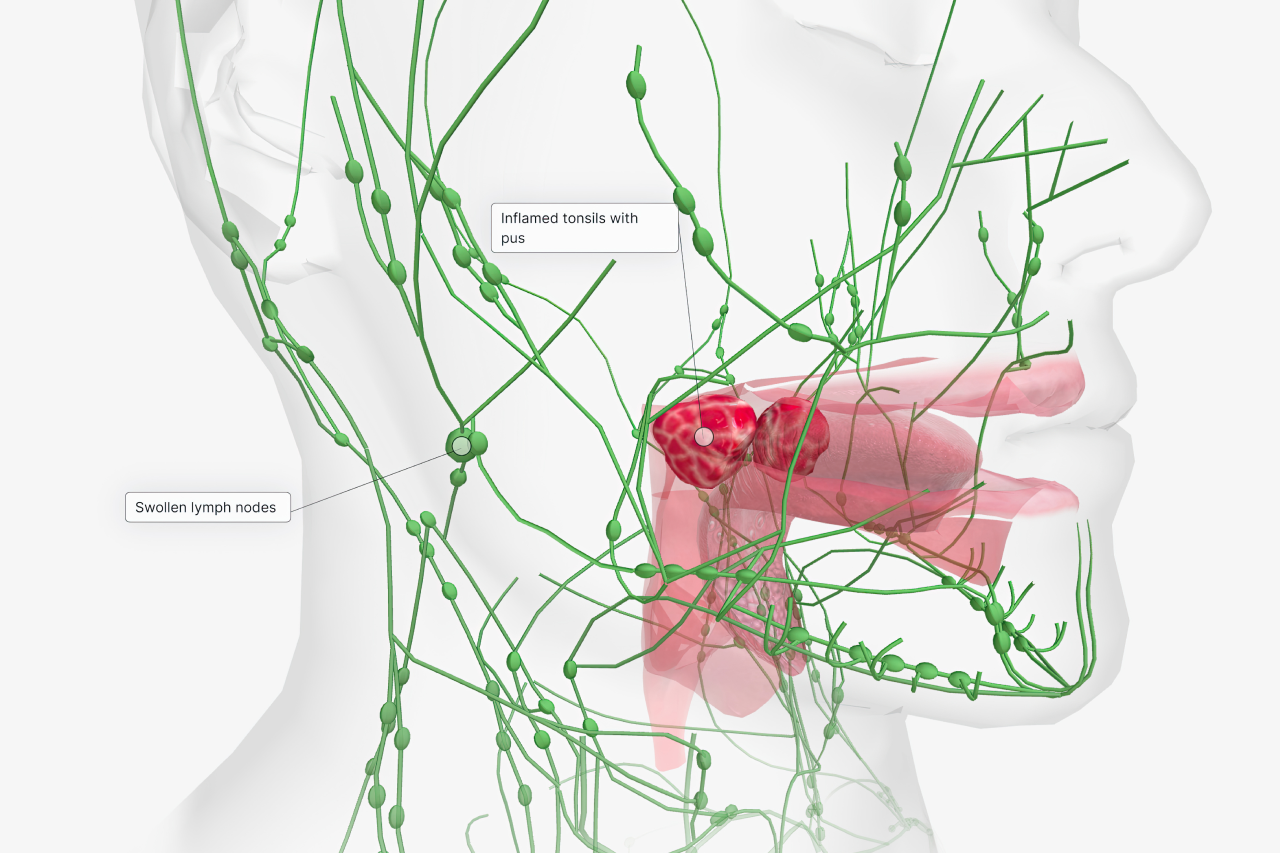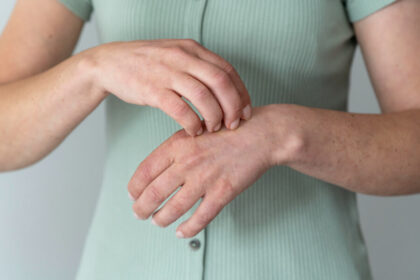Swollen lymph nodes Locations:
- Neck: Swollen lymph nodes in the neck typically indicate an infection or inflammation in the head, neck, or respiratory system. They may be felt along the sides of the neck, under the chin, or at the back of the head. Swollen lymph nodes in the neck area can occur due to neck infections, this is a condition in which the lymph nodes in the neck become enlarged. such as tonsillitis, strep throat, or even common colds. When the body fights off infections, the nearby lymph nodes may become enlarged and tender. Proper rest, fluids, and medical management are essential for recovery.
- Armpits: Swollen lymph nodes in the armpits also known as the axillary lymph nodes may be caused by infections or conditions affecting the arms, breasts, or nearby areas. Swelling of lymph nodes in the armpit can occur due to various reasons, including infections in the breast, arm, or hand. It may also be a result of immune system disorders or certain types of cancer. If you notice persistent swelling in the armpit area, it is important to seek medical evaluation.
- Inflammation of Axillary Nodes: Axillary lymph nodes are located in the armpit and are prone to inflammation. Infections or injuries to the arm, breast, or nearby areas can lead to swollen axillary nodes. This condition requires proper diagnosis and treatment to address the underlying cause.
- Groin: Swollen lymph nodes in the groin area usually indicate an infection or inflammation in the lower extremities, genital area, or urinary tract.
- Behind the Ears: Swelling of lymph nodes behind the ears can occur due to infections or conditions affecting the scalp, ears, or upper neck.
- Under the Jaw: Swollen lymph nodes under the jawline can be a sign of infection or inflammation in the mouth, teeth, or throat.
- Causes
Swollen lymph nodes, also known as lymphadenopathy, can occur due to various reasons. Here are some common causes:
- Infection: Swollen lymph nodes are often a result of an infection in the body. This can include bacterial, viral, or fungal infections. Common examples include strep throat, ear infections, colds, and flu.
- Inflammation: Inflammatory conditions such as rheumatoid arthritis, lupus, or certain skin conditions like dermatitis can trigger lymph node swelling.
- Immune system response: Lymph nodes may become enlarged when the immune system responds to an infection or inflammation. They act as filters to trap and fight off foreign substances.
- Cancer: In some cases, swollen lymph nodes can be a sign of cancer. Lymphoma, a cancer of the lymphatic system, can cause lymph nodes to enlarge. Additionally, metastatic cancer (cancer that has spread from its original site) can also affect nearby lymph nodes.
- Medications: Certain medications, such as those used to treat seizures or seizures, can occasionally cause lymph node enlargement as a side effect.
- Other conditions: There are several other less common causes of swollen lymph nodes, including certain autoimmune diseases, sarcoidosis, and Kawasaki disease.
Treatment
- Apply a warm compress to the affected area to reduce pain and inflammation. You can use a washcloth dipped in hot water and wrung out, or a heating pad or a hot water bottle. Hold the compress on the swollen node for about 10 minutes, several times a day
- Drink plenty of fluids to stay hydrated and help flush out any toxins or germs that may be causing the swelling. Water, juice, soup, and herbal tea are good choices. Avoid alcohol and caffeine, as they can dehydrate you and worsen inflammation.
- Rest your body and get enough sleep to help your immune system fight off the infection or condition that is causing the swelling. Avoid strenuous activities and stress, as they can weaken your immunity and delay your recovery.
- Elevate the swollen area if possible to reduce swelling and improve blood flow. For example, if you have swollen lymph nodes in your neck, you can prop up your head with pillows when lying down.
If your swollen lymph nodes are caused by a bacterial infection, such as strep throat or a skin infection, you may need antibiotics to treat the infection and reduce the swelling. Your doctor will prescribe the appropriate type and dose of antibiotics for your condition.
In some cases, swollen lymph nodes may be a sign of a rare but serious condition called lymphedema. Lymphedema is a chronic swelling of a body part due to damage or blockage of the lymphatic system. It can occur after surgery, radiation, infection, injury, or cancer treatment.
Lymphedema can cause pain, discomfort, reduced mobility, and increased risk of infection. Treatment for lymphedema may include compression bandages, massage, compression stockings, sequential pneumatic pumping, careful skin care and, rarely, surgery to remove swollen tissue or to create new drainage routes5.
If you have swollen lymph nodes that last longer than two weeks, are very large or hard, are accompanied by other symptoms such as fever, night sweats, weight loss, or difficulty breathing or swallowing, you should see a doctor as soon as possible. These could be signs of a serious condition that requires prompt diagnosis and treatment.
Conclusion
Swollen lymph nodes can be a common occurrence and are often a sign that the immune system is functioning properly. However, it is important to stay vigilant and pay attention to the duration, size, and associated symptoms of swollen lymph nodes.
While most cases of swollen lymph nodes resolve on their own, certain situations may require medical attention. If the swelling persists for an extended period, is accompanied by severe pain, or is associated with other worrisome symptoms such as fever, unexplained weight loss, or night sweats, it is recommended to seek medical advice.
A healthcare professional can evaluate the underlying cause of swollen lymph nodes through a physical examination, medical history review, and, if necessary, further diagnostic tests. Treatment options will depend on the specific cause of the swelling, ranging from conservative measures such as rest and self-care to targeted interventions like antibiotics or other medical therapies.
In general, maintaining a healthy lifestyle, including regular exercise, a balanced diet, and proper hygiene practices, can help support a robust immune system and reduce the risk of swollen lymph nodes. Being aware of the signs and symptoms of underlying infections or diseases and seeking prompt medical attention when needed can facilitate early diagnosis and appropriate management.
Remember, while swollen lymph nodes can be a cause for concern, they are often a natural response to infections or other immune system activities. By staying informed, proactive, and in close communication with healthcare professionals, you can take the necessary steps to ensure your well-being and address any potential underlying issues effectively.
FAQs
What are lymph nodes?
Lymph nodes are small, round structures located throughout the body as part of the lymphatic system. They help filter lymph fluid and contain immune cells that fight infections.
What causes swollen lymph nodes?
They are usually a sign that your body is fighting off an infection. Common causes include viral or bacterial infections, such as the common cold, flu, or strep throat.
Where can swollen lymph nodes be found in the body?
It can occur in various areas, including the neck, armpits, groin, and under the jaw or chin.
Are there other possible causes besides infections?
Yes, swollen lymph nodes can also be caused by other factors such as immune system disorders, certain types of cancer (lymphoma), and certain medications.
When should I be concerned about swollen lymph nodes?
While swollen lymph nodes are usually harmless and resolve on their own, you should seek medical attention if they are significantly enlarged, painful, or persist for more than two weeks.
How can I treat swollen lymph nodes at home?
Home remedies for swollen lymph nodes include getting plenty of rest, applying warm or cold compresses, practicing good hygiene, and taking over-the-counter pain relievers. However, treating the underlying cause is essential.





